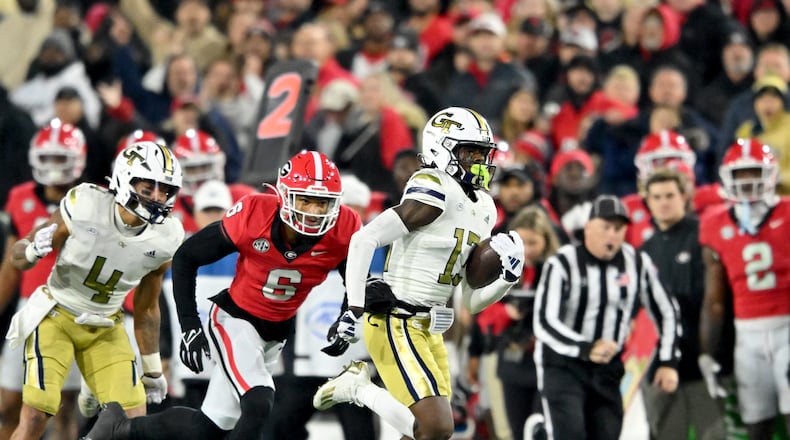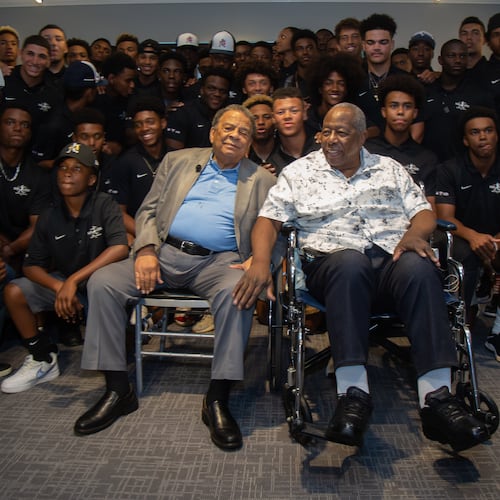Wednesday was another good day for Georgia Tech and coach Brent Key. After arriving in Tampa, Florida, for the Gasparilla Bowl on Monday, Key and his coaching staff closed down on a class of 23 high-school prospects on early signing day.
That’s in addition to eight players whose college transfers were announced Wednesday.
The commitments that might have meant the most to Key and his staff, though, were the ones that came from his own roster. After the Jackets earned their first bowl trip since 2018, 15 Tech players had put their names in the transfer portal from the end of the regular season through Wednesday afternoon, according to 247Sports. Only two, though, earned regular playing time this season – cornerback Kenan Johnson and defensive end Kyle Kennard. Both have one season of eligibility remaining, which Johnson will spend at Utah and Kennard at South Carolina.
While little about the portal and the whims of college football players is predictable, the vast majority of Tech players appears content to stay.
It stands in particular contrast to the offseason after the 2021 season, the second to last in former coach Geoff Collins’ tenure. After the 3-9 season and NIL deals becoming a part of the ecosystem, running back Jahmyr Gibbs was the most notable in a stream of Jackets starters who headed out the door.
“That’s pretty much everybody just wants to be here,” offensive tackle Jordan Williams said. “Everybody wants to see where this goes, everybody loves what we’re doing right now, everybody’s got good connection on the team, everybody’s friends with everybody. So at the end of the day, we just want to see how far we can go with each other.”
As Key pushes into his first offseason as the full-time coach after a breakthrough season, he can count it as a win for the stability and attractiveness of the program, not to mention what players are receiving through NIL deals with the Tech Way, the Tech collective launched in the fall of 2022.
“Georgia Tech, to me, is a case study of a program with great culture, great coach and doing enough (with NIL deals) to make sure that guys stay,” Jason Belzer, CEO of Student Athlete NIL, the company that manages the Tech Way, told The Atlanta Journal-Constitution.
Maybe no player represents the impact of this sentiment more than freshman wide receiver Eric Singleton Jr. After a standout season in which he vastly outperformed his standing as a three-star prospect out of Alexander High, he was appropriately recognized – he made multiple freshman All-American teams and received feelers about his interest in transferring.
Singleton’s mother, TeCara Carroll, told the AJC that the family had phone calls with people representing the interests of some SEC schools. (She couldn’t remember how many but put it at “more than two.”)
“They were just saying they were interested in Eric,” she said. “They were interested in wanting to speak with him about transferring, and I guess kind of see how we feel about it.”
It’s undoubtedly a common occurrence. With the freedom provided by the transfer portal, it only makes sense for teams higher up on the food chain to pluck players like Singleton after they’ve proved themselves at the FBS level. It’s a tempting pitch – come play your final three seasons in a stronger conference, in front of more fans and – let’s not leave this part out – with the potential for a bigger NIL deal from the school’s collective than what you’re getting at your own school.
The dialogue did not go far, though. He sent out a tweet Dec. 5 announcing that he wasn’t going anywhere.
“My plan when I first originally committed here was to be a part of this program,” Singleton said last week. “I had no plans of leaving. So that’s really it.”
His mother confirmed.
“Eric, he was ‘No’ from the beginning,” Carroll said. “He was not going anywhere. He was like, He’s happy where he is. And I was like, Well, if you’re happy, then there’s no need to even entertain.”
It is a different time in college athletics when an athlete’s decision to remain at his school is noteworthy, but that’s where we are. With the ease of transfer, the added benefit of NIL money and perhaps increased awareness that coaches don’t have to be the only ones who can jump ship for a better opportunity, athletes have reason to maximize their college eligibility as they best see fit.
Fans want their schools’ athletes to be as loyal as they are, but who can blame them for seeking better opportunities? And it’s not like those fans turn their nose up when an athlete transfers to their school.
Singleton’s Twitter bio likewise spells it out: “Professional Athlete.”
All that said, Singleton did exactly what Tech fans hoped he would. He decided he was best off right where he was.
“Really, I’m just a person, I like to stay down, remember where I came from,” he said. “No reason to really leave. I’ve got everything I need here.”
That includes a team that appears on its way up, an offense and a quarterback that have enabled him to flourish, a stable culture and the potential to earn a valuable degree.
“He loves it,” Carroll said of her son. “I can tell a difference in his personality since he’s been there.”
Part of the package, too, is an NIL deal with the Tech Way. According to Belzer, the average budget for a collective supporting a power-conference football team is $3.5 million. The Tech Way, he said, compares “very competitively” with that average. (The largest is around $8 million, Belzer said.)
Dividing the rough figure of $3.5 million by 85 scholarship players, that’s about $41,000 per player, although more prominent players earn much bigger slices than the less prominent ones. Most certainly, Singleton will receive a bigger NIL deal from the Tech Way when the time comes.
It’s a good time for Tech, but now the harder part arrives – keeping it going.
About the Author
The Latest
Featured



